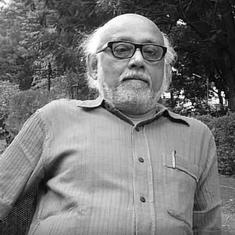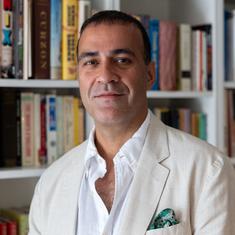India’s universities have once again been made subservient to the government in the name of those who valued and fought for independence of mind.
On Tuesday, centres of higher education were subjected to yet another missive – they were directed by the University Grants Commission to observe the 142nd birth anniversary of Sardar Vallabhbhai Patel, one of India’s founding fathers, in a manner specified by the government.
Through its directive, the UGC has not only demeaned universities but has also diminished itself by willingly acting as a courier for the orders the Ministry of Human Resource Development. The UGC notice said:
“The HRD ministry [Human Resource Development] has informed that it has been decided by Hon’ble HRM [Human Resource Minister] that all higher educational institutions in the country will observe ‘Nation Salutes Sardar Vallabhbhai Patel’ on 31st October 2017 to honour the birth anniversary of Sardar Patel by conducting programmes & events built around the theme of unity.”
The language of the directive is telling: the UGC did not even hide the fact that it was merely informed about the directive by the human resources development ministry, which in turn had not even even felt the need to consult the autonomous body.
Where’s the autonomy?
Over the last three years, the UGC has been functioning as not much more than a communication medium for the government. Its only task has been to tell the universities what the government desires them to do. In doing so, UGC seems to have forgotten two crucial things: one, that it was created as an autonomous institution and two, that it does not have powers in its Act to issue binding orders to universities.
The Commission was set up as an advisory body under the Ministry of Human Resource Development through an Act of Parliament in 1956. Section 12(d) of the UGC Act states that the Commission’s role is to “recommend to any University the measures necessary for improvement of university education and advise the university upon the action to be taken for the purpose of implementing such recommendation”.
The UGC’s primary mandate is determine and maintain standards of teaching, examination and research in Universities. It was created as an apex body in the field of higher education to serve as a link between the universities, state and central governments.
The Act envisioned the UGC as a body that would have a mind of its own and advise the Central and state governments on measures necessary for the improvement of university education. But the reverse is happen. Increasingly, it is the government that informs the UGC of its decisions, which the statutory body submissively conveys to universities.
This is unfortunate, because the Ministry of Human Resources Development has neither has great and original ideas to offer not does it have the wherewithal to formulate ideas on education. But the present ministry does not even seem to have that ambition. Its main idea seems to be turn universities into spaces to experiment on and rehearse its idea of nationalism.
It should be matter of grave concern for academia at large that the government is taking over the role of the UGC. It is is not for the government to bother with the curricular or extra-curricular affairs of the university.
Getting bolder
Besides, the the tone of the recent UGC order suggests that the Ministry is only getting more dictatorial in this interference. In its report on the latest UGC order, The Telegraph noted the gradual change in the language of the letters that the body sent to universities asking them to mark Patel’s birth date over the years.
In contrast to this year’s order, which said that it had “been decided” that all higher educational institutions in the country would mark the occasion “by conducting programmes and events built around the theme of unity”, last year’s October 17 missive said, “The following lists of events can be carried out in memory of the great unifier [Patel] by higher educational institutions in the country” (emphasis added).
In the years before that, the Commission struck an even more conciliatory tone. The October 21, 2015, issued by JS Sandhu, the commission’s secretary at the time, said: “You are requested to kindly organise the above mentioned activities in a befitting manner in your esteemed university and all colleges.”
On October 22, 2014, then commission chairman Ved Prakash had sent out a notice saying: “As a mark of respect for his contribution in these spheres, you are requested to organise different events on 31st October.”
Pushing agenda
Since the Modi government came to power in 2014, it has taken several steps to bolster Patel’s relevance and has accused previous Congress-led regime of sidelining India’s first deputy prime minister while favouring Prime Minister Jawaharlal Nehru and Mahatma Gandhi instead. Soon after Narendra Modi took charge as prime minister, his government commissioned a statue of Patel in Gujarat that is touted to be one of the world’s tallest statues once complete.
But it’s not just Patel’s birthday that has been used by the government as a chance to push forth its agenda. Gandhi Jayanti on October 2 is now officially marked as Swacch Bharat Divas, linking it to the government’s cleanliness drive. Similarly Teachers’ Day has also been appropriated by the government in the name of cleanliness.
This year, universities were also asked to observe the birth centenary of Deen Dayal Upadhaya, a member of the Rashtriya Swaymsevak Sangh and a leader of the Jan Sangh, the earlier avatar of the BJP. Similarly, the BJP is also trying to get the country to mark Christmas as Good Governance Day, as December 25 is also the birth date of party veteran Atal Bihari Vajpayee.
This circulars typically ask the universities to mark these occasions by organising essay, debate or painting competitions around the themes suggested by the government. In many cases, the institutions are asked to to submit photos of the programmes, purportedly as evidence.
Apart from extra-curricular events, the government has tried to push through its initiatives in the course content of universities as well. For instance, after the November 8 demonetisation of currency notes last year, universities were asked to introduce a credit-course for digital financial literacy and directed to rope in all their students and teachers to spread awareness about the government initiative. The central government is also using the UGC to directly communicate with the state universities, thus bypassing and undermining state governments.
Such directives also infantilise the universities, which now increasingly resemble the schools that students left behind for higher studies and a life of free thought.
What’s worse is no vice chancellor – neither current or nor former – is coming forward to tell the government and the public that this is not how the business of higher education is conducted in mature democratic societies.
On the one hand, the government is announcing grand plans for world-class universities. But on the other, existing universities are being turned into nurseries for breeding obedient citizens who toe the nationalist line approved by the government. In a situation where autonomy is a privilege and not a right, how can brilliant minds emerge?










